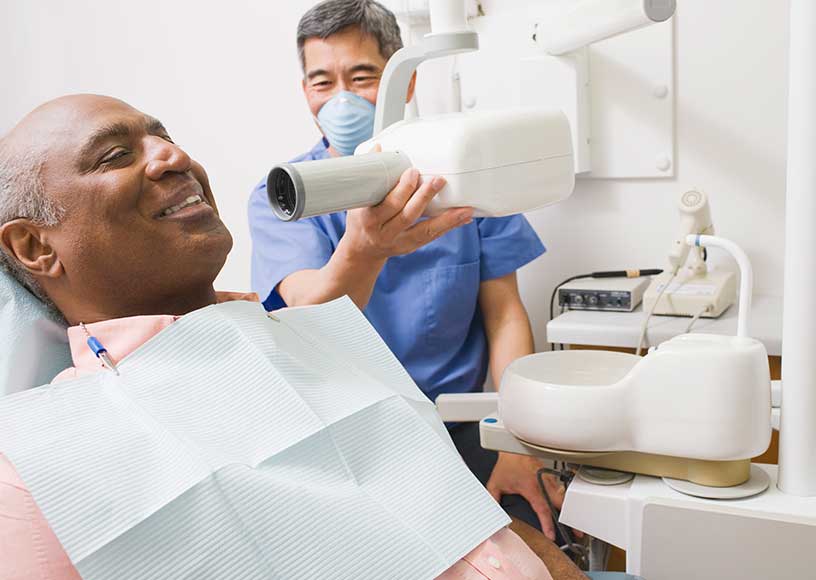Why you need fluoride at every age — and how to get enough

Teeth need a few basics for staying healthy. Those include brushing twice a day, flossing, regular dentist visits and fluoride.
Does that last one come as a surprise? Many of us think about fluoride as something that’s important for children’s teeth. But to keep teeth strong, fluoride is essential for everyone.
Fluoride plays a lifelong role in protecting against tooth decay, or cavities. It’s especially important as people reach their 60s, since 1 in 5 people ages 65 and older have untreated tooth decay, according to the Centers for Disease Control and Prevention (CDC).1
The good news: It’s easy to get fluoride every day. And it’s never too late to improve oral health, no matter how old you are. Here’s why fluoride is important for people in their 60s and beyond, along with the best ways to get enough to keep a smile bright.
What is fluoride?
Fluoride is a mineral that’s found in rocks and released into the soil, water and air.2 While river water has fluoride, it’s not enough to prevent cavities.
That’s why many communities add fluoride to drinking water.2 There’s also fluoride in some foods and in most everyday dental products, such as toothpaste and mouthwash.
How does fluoride work?
“Fluoride helps to strengthen enamel, which is the outermost layer of the tooth, making teeth more resistant to tooth decay,” says Teresa Yang, D.D.S., a dentist in Los Angeles.
Tooth decay is caused by bacteria in the mouth.3 When people eat, those bacteria produce acids that remove minerals from the tooth’s surface. Over time, the acid breaks down the enamel, causing a hole — or a cavity — to form in the tooth.
Fluoride protects teeth from decay by putting minerals back into teeth and interfering with bacteria’s ability to produce acid. By making teeth more resistant to acid, fluoride strengthens them.3
What are the best ways to get fluoride?
All adults older than 19 need 3 to 4 milligrams of fluoride a day.4 Luckily, most people in the United States get that amount.4 But if a person is unsure about whether their fluoride needs are being met, there are ways to make sure they are getting the right daily amount.
Use dental products with fluoride. It’s not tough to do — fluoride toothpaste makes up 95% of toothpaste sales, according to the American Dental Association (ADA).5 Look for toothpaste with the ADA seal of approval.
After brushing, follow up with a swish of mouthwash containing sodium fluoride, a compound of fluoride.5 The toothpaste and mouthwash will bring up the levels of fluoride in the saliva, so that it constantly bathes and strengthens the teeth.5
Drink fluoridated water. “Fluoride is routinely added to drinking water in many municipalities,” says Dr. Yang. In fact, roughly 75% of community water systems contain enough fluoride to protect the teeth, according to the ADA.6 Check to see if your town or city has fluoridated water with this search tool from the CDC.7
Drinking tap water with fluoride is the easiest way to get enough of the mineral. And it cuts down on tooth decay in both children and adults by 20% to 40%, studies show.5
But many people today drink bottled water. Some larger containers of bottled water can be purchased with added fluoride, notes Dr. Yang. Manufacturers aren’t required by the U.S. Food and Drug Administration to list fluoride as an ingredient on the label, though, unless they have added fluoride to the bottled water.8
It’s best to check with the manufacturer to see if a preferred brand has the mineral.9 Or just stick to tap water.
Eat foods and beverages with fluoride in them. Drinking tea or coffee brewed from tap water containing fluoride is another way to get this mineral.
Another option is eating foods that have higher levels of fluoride, including:4
- Raisins
- Oatmeal (cooked with water)
- Potatoes
- Rice
- Cottage cheese
Getting fluoride treatments at the dentist
“Generally, brushing your teeth twice a day with a toothpaste containing fluoride and drinking fluoridated water is enough to meet your fluoride needs,” says Dr. Yang. “But for older adults who may be more vulnerable to dental problems, a fluoride treatment at the dentist’s office can’t hurt.”
These professional applications of fluoride are more concentrated than the fluoride in toothpaste or water. The dentist or dental hygienist paint a fluoride varnish onto the teeth, explains Dr. Yang. Typically, she notes, it costs around $30 to $70 (a Medicare Advantage plan may cover it).
There are other risk factors that may call for a person to get a fluoride treatment at their next routine dental checkup. These include:10
- Smoking or chewing tobacco. It’s bad for teeth as well as overall health.
- A history of teeth issues. Being prone to cavities or having gum disease increases susceptibility to tooth decay. Extra fluoride can help.
- Dry mouth. This may result from using certain medications or having a condition such as Sjögren’s syndrome, an autoimmune condition that can affect the saliva glands.
- Diabetes. High blood sugar levels can increase the chances of gum disease and tooth decay.
- Not drinking fluoridated tap water. It’s best for people to get checked if they drink all their water through bottled water or live in an area with unfluoridated tap water.
- Difficulty with maintaining proper oral hygiene. This may be due to movement issues or conditions such a Parkinson’s or dementia or even a broken arm, explains Dr. Yang.
The bottom line: Fluoride can help prevent cavities and tooth decay, especially as people get older. The dentist can help make sure people are getting enough of this key mineral — and help keep their teeth in healthy shape.
